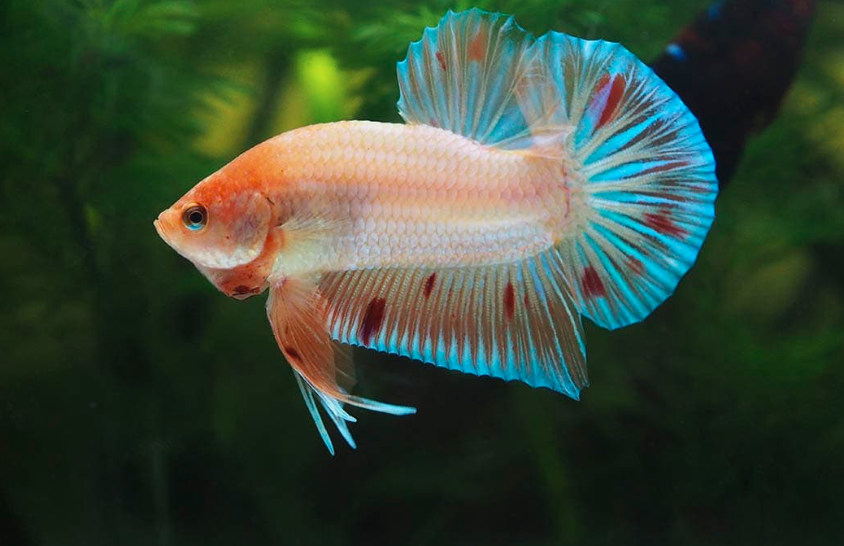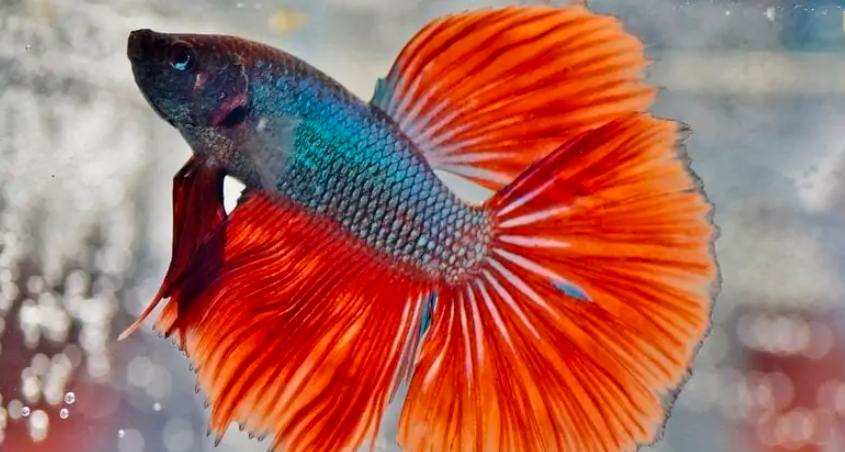Introduction To Can Betta Fish Eat Goldfish Food
Can Betta Fish Eat Goldfish Food?
The question can betta fish eat goldfish food is common among fish enthusiasts who keep both species in their aquariums. Bettas and goldfish have different nutritional needs, and feeding them the wrong type of food could lead to health issues. Fish owners often wonder if they can simplify feeding routines by using a single type of food for different species. While this might seem convenient, it’s crucial to identify if the nutritional content of goldfish food meets the dietary needs of betta fish.
Our goal is to provide a comprehensive, factual, and engaging analysis that benefits both your bettas and goldfish.

Can Bettas Eat Goldfish Food?
Many fish owners often wonder, Can betta fish eat goldfish food? The short answer is that while bettas can physically eat goldfish food, it is not ideal for their long-term health. Bettas and goldfish have different dietary requirements. Bettas are carnivorous fish, requiring a high-protein diet to thrive. In contrast, goldfish are omnivores, meaning their diet needs a mix of plant and animal matter.
Goldfish food is often formulated with a higher carbohydrate content and lower protein levels than what bettas require. Feeding bettas goldfish food might lead to nutritional deficiencies over time. Bettas typically feed on insects and larvae in their natural habitat. Goldfish food lacks the necessary proteins and specific nutrients that support a betta’s health, such as those provided by specialized betta pellets or live foods. While a betta may nibble on goldfish flakes or pellets occasionally, it should not become their primary food source. A diet primarily consisting of goldfish food can lead to problems such as lethargy, weakened immune system, and poor coloration in bettas.
For optimal health, always provide a balanced diet tailored to the specific needs of your aquatic pets. Betta fish flourish best on a diet rich in protein, such as betta-specific pellets, live or frozen brine shrimp, and other high-protein treats. If you have both goldfish and bettas, ensure you feed them separately to meet their unique dietary needs. This will help in maintaining the proper nutritional balance for both species and promote healthy, vibrant fish.

Can betta fish eat goldfish food, and will it harm them?
Understanding the Relationship Between Different Types Of Fish food and their impact is essential for any fish enthusiast. The short answer is that while goldfish food is not immediately toxic to bettas, it is not ideal for their long-term health. Goldfish food is formulated to meet the nutritional needs of goldfish, which are omnivores. This means their diet requires a balance of plant-based and protein-based ingredients.
In contrast, bettas are primarily carnivores and require a higher protein diet to thrive. Feeding bettas goldfish food regularly can lead to nutritional imbalances. Over time, this can affect the overall health, color, and vitality of your betta. The high vegetable content in goldfish food can be difficult for bettas to digest. This can result in bloating and digestive issues.
While an occasional feeding of goldfish food is unlikely to kill a betta, consistent feeding can lead to significant health problems. It is crucial to provide food that meets the specific nutritional requirements of bettas to ensure they remain healthy and vibrant. In summary, while goldfish food will not kill a betta immediately, it is not a suitable long-term diet. For the best care, feed your betta a diet specifically designed for their needs. This will ensure they live a healthy, long, and vibrant life.

Nutritional Differences Between Betta and Goldfish Food
Understanding the nutritional differences between betta and goldfish food is crucial, especially if you’re wondering, can betta fish eat goldfish food. First and foremost, bettas and goldfish have different dietary requirements due to their distinct biological and ecological backgrounds. Bettas are carnivorous and require a high-protein diet to thrive. Their natural diet in the wild primarily consists of insects and insect larvae, which provide the essential proteins and nutrients necessary for their well-being.
Goldfish, on the other hand, are omnivorous and consume a varied diet that includes both plant matter and small aquatic organisms. Goldfish food is typically formulated with higher carbohydrates and a lower protein content compared to betta food. This difference aligns with the goldfish’s digestive system, which is adapted to process a mix of protein and plant-based ingredients. One key distinction in composition is that betta food often contains more meat-based ingredients such as shrimp, krill, and worms. These ingredients ensure that bettas get the high levels of protein they need.
Goldfish food, however, tends to include a significant amount of vegetable matter, such as spirulina and wheat germ, to cater to their omnivorous needs. Furthermore, the inclusion of fiber is more substantial in goldfish food to aid in their digestion. Feeding betta fish goldfish food regularly means depriving them of the high protein that their carnivorous nature necessitates. Over time, this imbalance could lead to health issues such as reduced energy levels, less vibrant colors, and even stunted growth. Another aspect to consider is the size and texture of the food. Betta pellets are generally smaller and softer compared to goldfish pellets, making them easier for bettas to consume.
Goldfish food is often designed to float or sink slowly, whereas betta food is designed to float at the surface, aligning with their natural feeding behaviors. In conclusion, while betta fish can occasionally eat goldfish food without immediate harm, relying solely on it can lead to nutritional deficiencies. Providing them with a diet specifically formulated for bettas ensures they receive the proper balance of proteins and other essential nutrients. Can betta fish eat goldfish food is an important question, and the answer hinges on understanding these critical nutritional differences.

Can a Betta Fish Eat Regular Fish Food?
Can betta fish eat goldfish food, or even regular fish food?
While it’s possible for a betta fish to eat regular fish food, it’s crucial to understand the differences in nutritional needs between bettas and other fish species. Bettas are carnivorous by nature, requiring a diet high in protein to thrive. Conventional fish food, often designed for omnivorous fish, may lack the essential proteins and nutrients that bettas need. Therefore, while betta fish can technically consume regular fish food, it should not be a staple in their diet.
Moreover, many regular fish foods contain fillers and additives that may not be suitable for bettas. These fillers can potentially cause digestive issues or bloating. Therefore, even though a betta fish can eat regular fish food, it’s important to provide them with a diet specifically formulated for their needs. Feeding practices are another consideration. Betta fish are known to be picky eaters and may not readily accept regular fish food. They might nibble and spit it out if the texture or taste doesn’t appeal to them. This could lead to wasted food and compromised water quality, further stressing the fish.
In summary, while betta fish can eat regular fish food, it is not recommended as a primary food source. Ensuring that your betta receives a diet rich in high-quality protein from specialized betta pellets or flakes will help in maintaining their health and longevity. Always strive to match their natural dietary requirements for the best results.

Will Betta Fish Eat Food at the Bottom of Their Tank?
Many fish owners wonder, can betta fish eat goldfish food that sinks to the bottom of their tank? Betta fish are naturally surface feeders, which means they prefer to eat food that floats. This is largely due to their upturned mouths designed for surface feeding. However, bettas can eat food from the bottom of their tank if necessary. If the food is palatable and they are hungry, bettas will go to the bottom to retrieve it. Still, this is not their preferred way of feeding and should not be the regular feeding routine.
Feeding bettas at the bottom of the tank may lead to missed meals and deteriorating health. Uneaten food at the tank bottom can decompose, affecting water quality and causing health issues. Moreover, bettas are carnivorous, and goldfish food often lacks the high protein content they need. Consider switching to high-protein betta pellets or flakes specifically designed for their dietary needs. Proper feeding techniques will ensure your betta remains healthy and active in its aquatic environment.

What Kind of Food Do Betta Fish Eat?
Can betta fish eat goldfish food?
This is a common question among fish enthusiasts. While bettas are known for their striking appearance, understanding their dietary needs is crucial for their health and longevity. Betta fish are primarily carnivores. In the wild, they thrive on a diet of insects, larvae, and other small invertebrates. Thus, their nutritional requirements are rich in protein.
High-protein foods are essential for maintaining their vibrant colors and energy levels. Commercially available betta food usually includes pellets and flakes specifically formulated to meet their dietary needs. These foods are high in protein and contain essential nutrients like vitamins and minerals. Be sure to check the ingredient list to ensure it contains a high percentage of animal-based protein. Frozen and live foods are excellent additions to a betta’s diet. Daphnia, bloodworms, and brine shrimp are popular and nutritious options. Feeding these occasionally can help mimic their natural diet and keep them engaged. Vegetables and fruits are rarely part of a betta’s diet, as they don’t offer the necessary protein content.
However, some betta owners introduce small amounts of vegetables like peas to aid in digestion. These should be given sparingly and not replace their primary protein source. It is essential to feed betta fish small quantities, typically once or twice a day.
Overfeeding can lead to health issues like bloating and constipation. Uneaten food should be removed to maintain water quality and prevent it from sinking to the tank bottom. Fish food formulated for bettas ensures they meet their nutritional requirements. Goldfish food, on the other hand, is designed differently.
Goldfish are omnivores, requiring a more balanced diet of plants and animal matter. Thus, goldfish food usually contains lower protein levels and higher vegetable content, which may not be adequate for a betta’s needs. In conclusion, betta fish require a high-protein diet to stay healthy and vibrant. Stick to foods formulated for bettas, and occasionally supplement with live or frozen options for added nutrition and enrichment. Carefully monitoring their feeding habits will ensure a long, colorful life for your betta.

Final Thoughts
Can betta fish eat goldfish food?
The answer lies in understanding the specific dietary needs of each species. While bettas may nibble on goldfish food, it is not ideal for their long-term health. Betta fish are primarily carnivorous, requiring a high-protein diet, whereas goldfish food is typically plant-based and doesn’t meet all of a betta’s nutritional needs. Feeding bettas with goldfish food occasionally may not cause immediate harm. However, consistent feeding can lead to nutritional deficiencies and health issues over time.
It’s crucial to feed your betta fish specialized betta food that meets their dietary requirements, such as betta pellets and high-protein flakes. For optimal care, consider consulting a veterinarian to ensure you are feeding your fish in accordance with their specific needs.
In conclusion, understanding the dietary needs and feeding your betta accurately will ensure they thrive. Providing appropriate food helps avoid potential health issues and contributes to the well-being of your pets. Remember, accurate information and proper care are paramount for the longevity and happiness of your fish.
